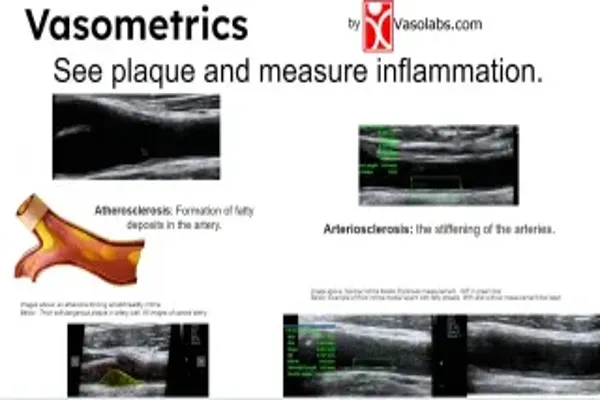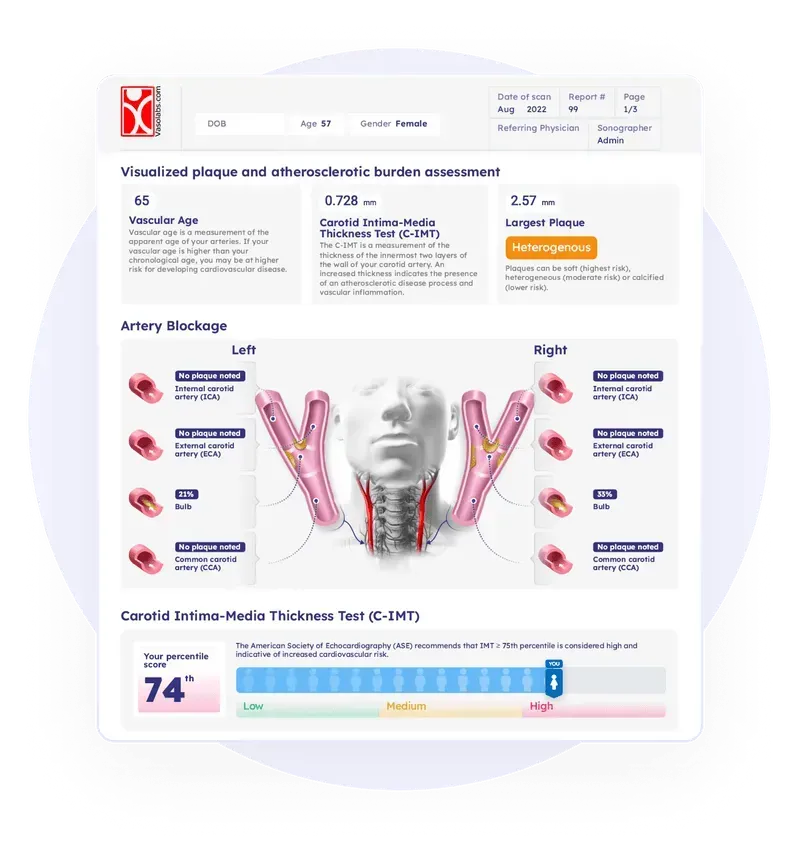801-797-2297
1414 South 600 West, Bountiful, UT 84010
Mon-Friday, 8am-5pm
801-797-2297 | Mon-Friday, 8am-5pm
Welcome to Our Blog: Vasolabs News and Education

Understanding Carotid Artery Scan Results
Introduction to Carotid Artery Scans
Carotid artery scans are a look-see into your neck veins, specifically the carotid arteries. These arteries are the main ones taking oxygen-rich blood from your heart to your brain. Think of them as the highways for your brain's oxygen. A scan checks if there's any traffic jam — meaning, if there's any blockage that could lead to serious issues like strokes. The process uses ultrasound tech, which is just fancy talk for using sound waves to create pictures of what's going on inside there. There's no pain, no needles, it's quick and it's something doctors recommend especially if you're hitting a certain age or have risks for stroke or heart disease. It’s like getting a sneak peek at a potential problem before it becomes a bigger headache. And knowing what’s up with your carotid arteries can be a lifesaver, literally.
What is a Carotid Artery Scan?
A Carotid Artery Scan is a simple, painless test that looks at the carotid arteries in your neck. These arteries are the main suppliers of blood to your brain. Think of them as highways for blood flow. The test uses ultrasound technology, which means sound waves, to create pictures of the inside of these arteries. Why does this matter? Because it helps doctors see if there's any buildup of fatty materials, called plaque. Plaque can slow down or block blood flow to the brain, leading to serious problems like strokes. So, essentially, this scan is checking the roads to your brain to make sure traffic is flowing smoothly. It's crucial for catching issues early and keeping you healthy. No needles, no pain, just a bit of gel and a probe running over your neck. Simple, right?
Why Do You Need a Carotid Artery Scan?
Getting a carotid artery scan might sound like a big deal, but it's straightforward. Your doctor might suggest one to check if your carotid arteries, those big blood vessels in your neck that supply blood to your brain, face, and neck, are having some trouble. Why bother? Well, if these arteries are narrowed or blocked — thanks to plaque build-up — you're at a higher risk of having a stroke. That's because less blood and oxygen get to your brain, which is a bad situation. So, in a nutshell, by getting this scan, you're taking a step towards preventing a potential stroke. If your doctor suspects you’re at risk because of your family history, age, or lifestyle factors like smoking and a poor diet, they'll likely order this scan. It’s all about playing it safe and keeping you healthy.
Preparing for Your Carotid Artery Scan
Before you get your carotid artery scan, there's not much you need to do. Just wear something comfortable and keep your neck area clear of any jewelry or accessories. This scan checks your carotid arteries—those big blood vessels in your neck that send blood to your brain. It's easy and painless. Most times, you'll be lying down while a technician uses an ultrasound machine to look inside your neck. The whole thing is quick, taking about 30 minutes. You don't need to fast or make any big changes to your routine before the scan. Just show up, relax, and let the technician do their work. It's a simple step to make sure your blood highways to the brain are in good shape.
Understanding the Procedure: How It's Done
To get a clear picture of your carotid arteries, doctors use a non-invasive test called a carotid artery scan. Here's how it usually goes down: You lie down, and a technician applies a small amount of gel on your neck. This gel helps the ultrasound device slide smoothly and ensures better images. Then, they move a handheld device, known as a transducer, over your neck. This device sends sound waves into your body, which bounce back to create images of your carotid arteries on a screen. The whole thing is painless and quick, taking about 15 to 30 minutes. What the doctors are looking for are signs of narrowing or blockages in your arteries which could indicate a higher risk of stroke. So, by keeping still and relaxed, you're helping them get the best possible look at what's going on in there.
Interpreting Your Results: The Basics
When you get your carotid artery scan results, they will show how well blood flows through your carotid arteries. These arteries supply your brain with blood. The scan looks for plaque buildup. Plaque is a mix of fat, calcium, and other substances that can narrow or block arteries. Your results will likely say one of these things: normal blood flow, mild blockage, moderate blockage, or severe blockage. Normal blood flow means your arteries are clear. Mild to moderate blockage may require lifestyle changes, like eating healthier or exercising more. Severe blockage could mean you need medication or surgery. Your doctor will use these results to decide how to keep your arteries healthy. Remember, understanding your results is the first step to taking care of your heart and brain health.
What Do Normal Results Mean?
When you get your carotid artery scan results back, seeing "normal" might make you breathe a sigh of relief. But what does that really mean? Simply put, normal results suggest your carotid arteries are clear of significant blockages or narrowing. These arteries, running up either side of your neck, supply your brain with oxygen-rich blood. If they were blocked, it would spell trouble, increasing your risk of stroke. A normal scan indicates you're currently at a lower risk for such complications. It means the blood flow to your brain is unimpeded, keeping things running smoothly up there. However, remember, this is just a snapshot in time. Keeping those arteries clear is a long game, requiring a healthy lifestyle and regular check-ups, especially as you age. So, while "normal" is good news, it's not a free pass. Keep looking after your health to ensure those results stay that way.
Understanding Abnormal Results: Potential Implications
When your doctor says your carotid artery scan shows abnormal results, it means they've spotted something that’s not quite right. First thing, keep calm; it’s about figuring out the next steps together with your healthcare provider. Abnormal results usually point to narrowed or blocked arteries, and this is key because these arteries supply blood to your brain. When they're narrowed, it's often due to plaque buildup - a mixture of fat, cholesterol, and other substances. This condition is known as carotid artery disease.
What does this mean for you? Well, it raises your risk of experiencing a stroke. Strokes happen when a part of the brain gets damaged because it's not getting enough blood. This is serious stuff, but the good news is, catching it early means you can take action to lower those risks. Treatments vary depending on how severe your case is. They might include medications to lower cholesterol and blood pressure, lifestyle changes like switching up your diet or getting more exercise, or even surgery to clear the blockage if needed.
Remember, every person's health situation is unique, so the implications of abnormal results can differ. Your doctor will guide you through understanding your specific condition and the best ways to tackle it. It’s super important to follow their advice and ask questions if you’re unsure about anything. Together, you can work on a plan to keep your arteries and your brain as healthy as possible.
Next Steps After Receiving Your Carotid Artery Scan Results
After getting your carotid artery scan results, if the report mentions anything unusual or if there are signs of blockage, it's time to take action. Talk to your doctor right away. They might want to discuss further testing or treatment options such as medication, lifestyle changes, or in some cases, surgery. Here's what you typically might do: 1. Schedule a follow-up appointment to go over the results in detail with your doctor. 2. Discuss lifestyle changes; this may include eating healthier, getting more exercise, quitting smoking, or controlling diabetes and high blood pressure. 3. Consider medication to manage risk factors like high cholesterol or blood pressure. 4. In severe cases, explore surgical options like carotid endarterectomy or angioplasty. Remember, the goal is to prevent a stroke, so taking these steps seriously is crucial. Stay proactive, ask questions, and keep regular appointments with your healthcare provider.
FAQs: Common Concerns and Questions About Carotid Artery Scans
When it comes to carotid artery scans, patients have a lot of questions. Here's breaking it down. What is a carotid artery scan? Simply put, it's a test that checks for blockages in your carotid arteries, which could lead to a stroke if not addressed. Why should I get one? If you're over 60, have a family history of heart disease, or lifestyle factors like smoking, you might be at risk. This scan helps catch issues early. Does it hurt? Not at all. It's a non-invasive ultrasound. You're in and out, no pain. What do the results mean? If your doctor says your arteries are clear, you're in the clear. Blockages mean you'll have to chat about next steps, maybe lifestyle changes or medication. Is the scan covered by insurance? Often, yes, if deemed medically necessary. But check with your provider to make sure. Getting a carotid artery scan could be a step toward preventing stroke, so asking these questions is a good move.
Why should you get this C-IMT scan?
Informed patients make better decisions.

Early Detection of Heart Disease Risk
A C-IMT scan can act as an early warning system by identifying increased thickness in the artery walls long before any symptoms of heart disease or stroke become evident.

Personalized Treatment Plan
The results of a C-IMT scan can help your doctor tailor a treatment plan to reduce your risk of heart attack or stroke, which is the leading cause of death and disability in the world.

Non-Invasive and Safe
Unlike some other tests, the C-IMT scan is non-invasive and uses ultrasound, not radiation. It's safe and doesn't require any special preparation.

Family History
If you have a family history of early heart disease or stroke, the scan can provide valuable information about your own risk, helping you and your doctor to take preventive measures.

Peace of Mind
If you are anxious about your cardiovascular health, a vasometric scan can provide reassurance if your results are within a normal range.
Vasolabs Is A Premier Provider Of Safe, Convenient Heart Disease Screenings.
Vasolabs Is A Premier Provider Of Safe, Convenient Heart Disease Screenings.
Uses the newest ultrasound technology
Determines whether or not you have heart disease
Pain-free. Requires no wires, treadmills, or needles.
Takes only 15 minutes
Get your Easy-to-Understand Report within 24 hours
Optional Discussion with your Clinician
Schedule a test to see if you’re at risk of heart disease!
Identify Your Risks of Getting Cardiovascular Disease With a Simple C-IMT Scan!
Know if You Are at Risk for Heart Attacks, Strokes, and other Cardiovascular Diseases:
$499 $249
What's Included in your Report:
See your Vascular Age!
Soft or Calcified Plaque is visualized, you’ll see it all.
Track Your inflammation, Know your Artery Blockage.
Informed patients make better decisions.
Loved ones depend on you.
Do I Need a Heart Screening?
Here is a checklist of factors that put you at elevated risk for heart attack, stroke, and other forms of cardiovascular disease:
Over 40 years of age
Family history of heart disease/stroke
Overweight
Increased cholesterol level
High-fat diet
Tobacco user
High blood pressure
Diabetic
Metabolic syndrome
Erectile dysfunction
Psoriasis

Peace of Mind is Priceless

Looking back, it's chilling to realize how close I came to the edge. I opted for a test at Vasolabs on a whim, without any particular symptoms. Boy, am I glad I did! Turns out, my arteries were nearly clogged up - something regular doctors wouldn't have caught unless there were signs of a problem. By the time I got a couple of second opinions and returned to my regular doctor, my arteries were 95% blocked. If I hadn't taken the test when I did, I could have had a stroke. Trust me when I say this, going to Vasolabs was one of the best decisions I've ever made.
- George B

I was really worried about getting a heart attack because its already happened in our family. So taking this test gave me the peace of mind I was looking for. And it was so cool to see the age of my artery was younger than I was!!
- Barbara L.

I went to Vasolabs for their C-IMT testing, thinking it'd be a complicated deal, but nope! It was as easy as getting a photo taken. And guess what? They found an issue that could've been a silent threat. Thanks to them catching it early, my doctor and I are on top of it now. Honestly, I feel like I dodged a bullet. Big thumbs up for Vasolabs!
- Walter S.

I saw an ad on Facebook and I got the C-IMT Test for myself and my husband, it was such an easy process. And a great gift idea for family. It was really fun to look at the results and good to know I need to work on my health.
- Jessica F.
Frequently Asked Question
What is a C-IMT scan?
A C-IMT Scan is a non-invasive procedure that uses ultrasound technology to measure the thickness of your carotid arteries' walls. These arteries, located on each side of your neck, supply blood to your brain. Over time, plaque can build up in these arteries, causing them to thicken. This is often an early sign of atherosclerosis, a disease that can lead to serious conditions such as heart attacks and strokes.
Where do I go to get this scan?
For your quick, 15-minute appointment, simply head over to our facility located at 1414 South 600 West, Bountiful, UT 84010.
Who takes my test?
Dean Ence, an expert sonographer, will be handling your fast, no-pain test to figure out the 'age' of your arteries. This test checks how thick your artery walls are - thicker walls can mean inflammation. It's all simplified for you to understand easily. We also spot and show plaque, whether soft or hard, in your arteries. You get detailed pictures from the ultrasound for your records. Taking care of your health is our main goal!
How long does the C-IMT Scan and Report take?
The duration of the C-IMT scan can vary depending on various factors, like the complexity of the patient's condition. Typically, a Vasometric scan takes around 15 minutes to complete. The report is done and delivered within 24 hours to you.
Will my insurance cover this C-IMT Scan?
No. Hospitals charge $800, but our cost is $249.

